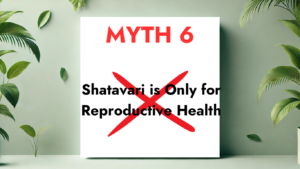In the world of Ayurvedic medicine, Shatavari (Asparagus racemosus) is hailed as a miraculous herb, often referred to as the “Queen of Herbs.” Known for its adaptogenic, rejuvenating, and hormone-balancing properties, Shatavari has been used for centuries to support women’s health, boost immunity, and enhance vitality.
However, as its popularity grows in modern wellness circles, so do misconceptions and myths surrounding its benefits, uses, and effects.
In this blog, we’ll separate fact from fiction, debunk common myths, and uncover the true potential of this incredible herb.
Myth 1: Shatavari is Only for Women

Debunking the Myth:
Shatavari is widely marketed as a “women’s herb” because of its hormone-balancing effects, especially in supporting menstrual health, fertility, and menopause-related issues. However, this does not mean that Shatavari is exclusively for women.
The Truth:
While Shatavari is indeed beneficial for female reproductive health, it is equally effective for men. In men, Shatavari can help improve sperm quality, boost libido, reduce stress, and support overall vitality. Its adaptogenic properties also make it an excellent herb for reducing cortisol levels and enhancing physical endurance for both men and women.
Takeaway: Shatavari is not gender-specific—it offers benefits for overall health, stress relief, and hormonal balance for everyone.
Myth 2: Shatavari Causes Weight Gain

Debunking the Myth:
A common misconception is that Shatavari causes weight gain, particularly because it is believed to increase water retention and appetite.
The Truth:
Shatavari does not directly cause weight gain. Instead, it helps balance hormones, improve digestion, and support fluid balance in the body. If a person experiences weight gain while taking Shatavari, it is often because of an underlying hormonal imbalance being addressed rather than the herb itself causing fat accumulation.
Additionally, Shatavari contains saponins, which have antioxidant and anti-inflammatory properties that support metabolism and overall bodily functions.
Takeaway: Shatavari does not inherently cause weight gain but may support the body in achieving hormonal balance, which could lead to changes in appetite or metabolism.
Myth 3: Shatavari Acts as a Contraceptive

Debunking the Myth:
Some people believe that Shatavari has contraceptive properties and can prevent pregnancy.
The Truth:
There is no scientific evidence to support the claim that Shatavari acts as a contraceptive. On the contrary, it is often recommended as a fertility-supporting herb for women trying to conceive. Shatavari helps regulate menstrual cycles, improve uterine health, and create a favorable environment for conception.
Takeaway: Shatavari supports fertility, not contraception. Women looking for birth control options should not rely on Shatavari as a contraceptive.
Myth 4: Shatavari Can Be Taken Without Medical Supervision

Debunking the Myth:
Because Shatavari is a natural herb, many people believe it is completely safe to consume without consulting a healthcare professional.
The Truth:
While Shatavari is generally considered safe, it may not be suitable for everyone. People with certain health conditions, such as estrogen-sensitive cancers, or those taking hormone-related medications, should consult a healthcare provider before consuming Shatavari. Additionally, individuals allergic to asparagus (as Shatavari belongs to the same family) should avoid it altogether.
Takeaway: Even natural remedies like Shatavari can have contraindications. Always consult a healthcare professional before starting supplementation.
Myth 5: Shatavari Works Instantly

Debunking the Myth:
Many people expect immediate results after consuming Shatavari, whether for hormonal balance, increased libido, or stress relief.
The Truth:
Like most herbal remedies, Shatavari works gradually. Its adaptogenic properties build up in the body over time, and consistent use is required to see significant benefits. Depending on the individual’s health condition and body type, it may take weeks or even months to notice measurable improvements.
Takeaway: Patience is key when consuming Shatavari. Consistency and long-term use are essential for experiencing its full benefits.
Myth 6: Shatavari is Only for Reproductive Health

Debunking the Myth:
Another common myth is that Shatavari’s benefits are limited to reproductive health.
The Truth:
While Shatavari is renowned for its reproductive health benefits, its effects go far beyond that. Shatavari is an excellent adaptogen that helps the body cope with stress, supports the immune system, improves digestion, and enhances cognitive functions. Its antioxidant properties also help protect the body against cellular damage.
Takeaway: Shatavari is a multi-purpose herb with benefits extending to immunity, digestion, and mental health, not just reproductive wellness.
Myth 7: All Shatavari Supplements Are the Same

Debunking the Myth:
Some people assume that any Shatavari supplement they pick up will deliver the same results.
The Truth:
The quality and potency of Shatavari supplements can vary widely depending on the source, processing methods, and purity. Some supplements might contain fillers or low-quality extracts, reducing their efficacy.
When choosing a Shatavari supplement, look for standardized extracts, third-party testing, and reputable brands that follow high manufacturing standards.
Takeaway: Not all Shatavari supplements are created equal—quality matters.
Myth 8: Shatavari Has No Side Effects

Debunking the Myth:
Some people believe that because Shatavari is natural, it cannot cause any side effects.
The Truth:
While Shatavari is generally safe for most people, excessive doses or misuse can lead to side effects such as digestive issues, allergic reactions, or breast tenderness in some individuals.
Additionally, people with kidney disorders or fluid retention problems should avoid Shatavari unless advised by a healthcare provider.
Takeaway: Even natural remedies can cause side effects when misused or consumed inappropriately.
Final Thoughts
Shatavari is an incredibly versatile and beneficial herb with a long-standing history in Ayurvedic medicine. However, like any natural supplement, it’s important to approach it with accurate information and realistic expectations.
Whether you’re considering Shatavari for reproductive health, stress relief, or immune support, ensure you consult a healthcare professional, choose high-quality supplements, and give your body time to respond.
By debunking these common myths, we can better appreciate the true potential of Shatavari and make informed decisions about its use in our wellness journeys.

